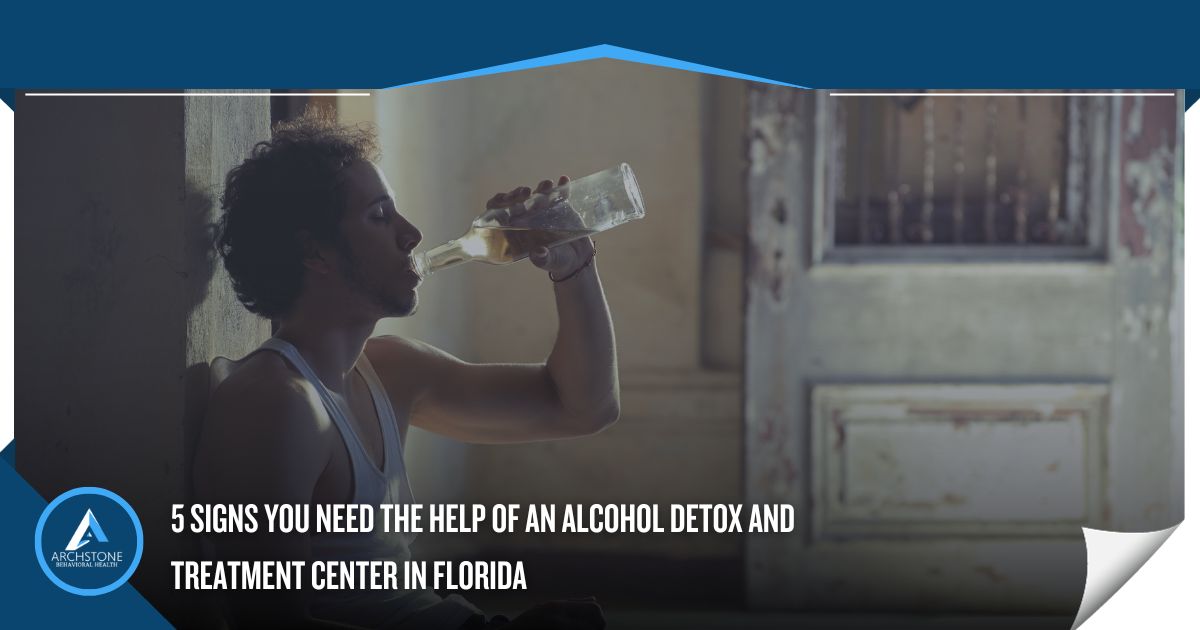5 Signs You Need the Help of an Alcohol Detox and Treatment Center in Florida
Get Help Now

Living with untreated alcohol abuse or addiction can increase your risk for serious, sometimes life-threatening complications. Learning the signs of alcohol abuse and addiction can help you recognize unhealthy drinking patterns and find treatment quickly.
This article will detail five of the most common signs you need the help of an alcohol detox and treatment center. If you or someone you love struggles with alcohol abuse or addiction, reach out to the team at Archstone Recovery now to learn about our supportive, comprehensive treatment programs.
Five Signs You Need Alcohol Abuse Treatment
The consequences of an untreated alcohol use disorder can be severe. People may face serious health problems, lose jobs and relationships, or become tangled up with life-altering legal issues. Alcohol use can quickly spiral out of control, and seeking treatment as early as possible drastically improves your chances of lifelong sobriety.
Recognizing the signs of alcohol abuse is the first step toward getting the help you need to begin your recovery journey. While the symptoms of alcohol abuse and addiction can vary from person to person, there are some common signs that indicate a problem that requires professional help.
Here are five common signs you need the help of an alcohol detox and treatment center.
1. You experience alcohol withdrawal symptoms.
Alcohol works in the body by depression activity in the central nervous system (CNS). When you drink heavily for a prolonged period, your body can adjust to the presence of alcohol in the system. If you stop drinking, you’re likely to experience withdrawal symptoms that can include:
- Tremors
- Agitation
- Irritability
- Nausea
- Vomiting
- Excessive sweating
- Elevated heart rate
- Insomnia
- Headache
- Loss of appetite
Some people develop dangerous withdrawal symptoms, including life-threatening dehydration, seizures, and a severe condition called Delirium Tremens, which causes seizures, hallucinations, and extreme agitation. It’s essential to have medical and emotional support during detox to avoid potentially hazardous complications during withdrawal from alcohol.
2. You develop a tolerance to alcohol.
If you drink heavily, you may develop tolerance over time–meaning that you need to drink more to get the desired results. People with alcohol tolerance may be able to drink large amounts of alcohol without feeling “buzzed” or may need to drink more than they used to to feel its effects.
Tolerance can develop slowly. For example, someone who regularly drinks a glass of wine every night to unwind may discover that, after a few weeks, they need to have two glasses to feel relaxed. In time, this may progress and result in needing three, four–or an entire bottle.
Tolerance is one of the primary symptoms of alcohol addiction. It is usually a sign that you need the help of an alcohol detox and treatment center so that you can safely stop drinking and remain sober.
3. You take risks while drinking.
Alcohol impairs your judgment. People who drink–especially those who drink heavily– may engage in behaviors while intoxicated that they wouldn’t consider while sober. People who are intoxicated may participate in illegal activities, get into fights, drive drunk, or engage in risky sexual behaviors.
Alcohol intoxication increases the risk that you will be the victim of a sexual assault or other crime or that you will become injured or die due to a fall, accident, drowning, or exposure to extreme temperatures.
People with alcohol addiction are more likely to experience significant social, legal, and financial trouble or to cause irreversible harm to themselves or others. Taking risks or behaving out of character frequently while drinking are clear signs that someone needs help for alcohol abuse.
4. Neglecting your responsibilities.
When people develop alcohol abuse or addiction, other aspects of their lives take a back seat. People may regularly become too intoxicated or hungover to meet their responsibilities at home, school, or work. Someone who was once reliable and engaged in life may become withdrawn, erratic, or untrustworthy. People with alcohol addiction may neglect even the most basic daily tasks, such as taking care of their hygiene, preparing meals, or cleaning up after themselves.
Repeated absences, poor performance, and interpersonal difficulties may cause them to lose their job or miss out on opportunities. Their relationships may suffer, and they may become isolated.
5. Trying to quit but failing.
No one chooses to be addicted to alcohol. While behaviors and decisions may put people on a path toward addiction, addiction is often a deeply-rooted and complex condition. People with alcohol abuse and addiction may attempt to stop drinking only to find that they experience cravings, withdrawal symptoms, or can’t cope with stress and challenges without alcohol.
If you or someone you love exhibit signs of alcohol abuse or addiction, seek help right away. Don’t wait for alcohol abuse to improve or disappear on its own. Waiting to get help will only allow the addiction to become more severe. Get help as soon as you recognize the signs you need help.
Find an Alcohol Detox and Treatment Center in Florida
If you or a loved one requires support from an alcohol detox and treatment center in Florida, the help you need is available at Archstone Behavioral Health. Contact our caring specialists now to learn about our treatment programs or to schedule an intake evaluation.